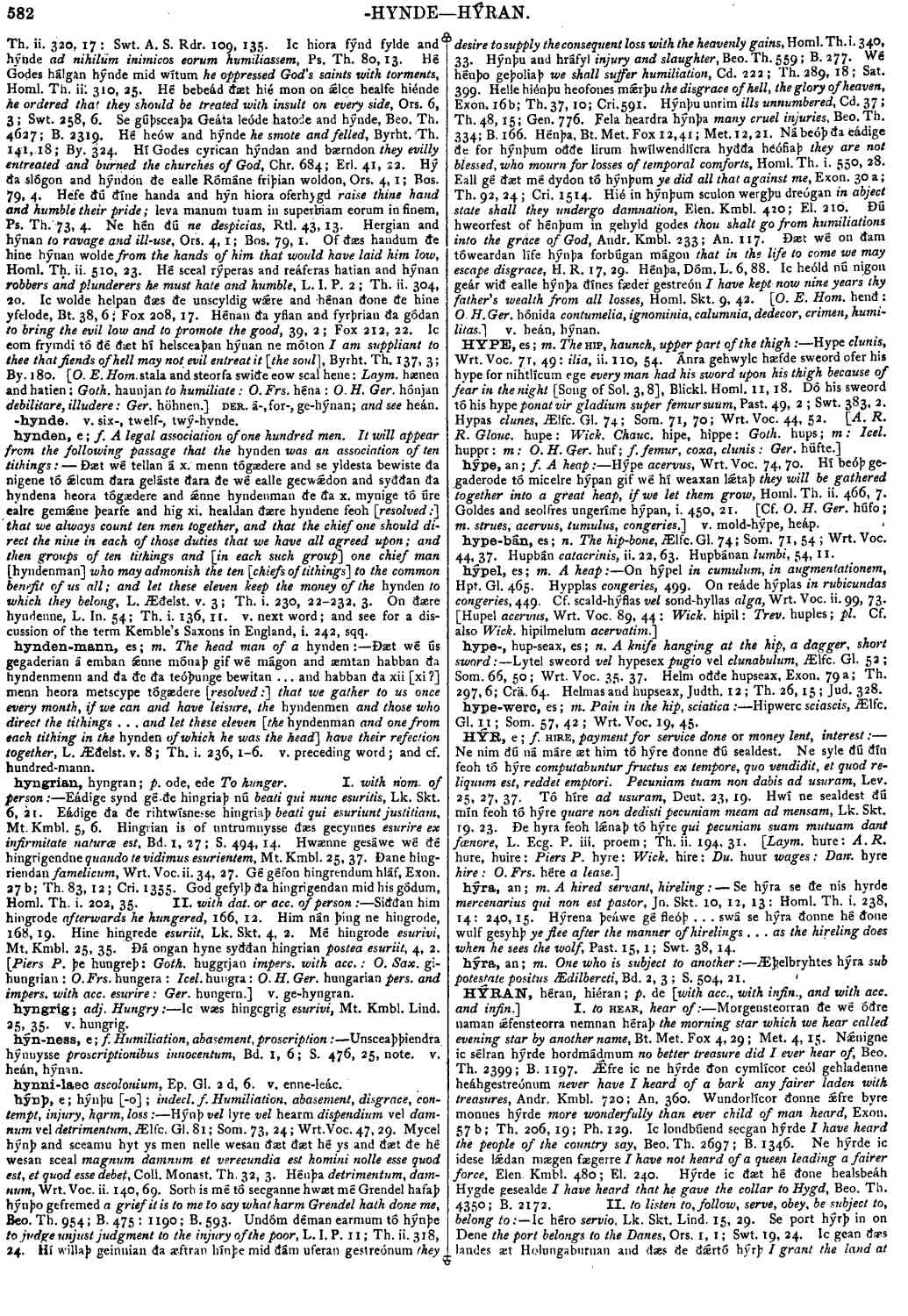HÝRAN
- verb [ weak ]
-
Morgensteorran ðe wé óðre naman ǽfensteorra nemnan héraþ
the morning star which we hear called evening star by another name,
- Bt. Met. Fox 4, 29 ;
- Met. 4, 15 .
-
Nǽnigne ic sélran hýrde hordmádmum
no better treasure did I ever hear of,
- Beo. Th. 2399 ;
- B. 1197 .
-
Ǽfre ic ne hýrde ðon cymlícor ceól gehladenne heáhgestreónum
never have I heard of a bark any fairer laden with treasures,
- Andr. Kmbl. 720 ;
- An. 360 .
-
Wundorlícor ðonne ǽfre byre monnes hýrde
more wonderfully than ever child of man heard,
- Exon. 57 b ;
- Th. 206, 19 ;
- Ph. 129 .
-
Ic londbúend secgan hýrde
I have heard the people of the country say,
- Beo. Th. 2697 ;
- B. 1346 .
-
Ne hýrde ic idese lǽdan mægen fægerre
I have not heard of a queen leading a fairer force,
- Elen. Kmbl. 480 ;
- El. 240 .
-
Hýrde ic ðæt hé ðone healsbeáh Hygde gesealde
I have heard that he gave the collar to Hygd,
- Beo. Th. 4350 ;
- B. 2172.
-
Ic héro
servio,
- Lk. Skt. Lind. 15, 29.
-
Se port hýrþ in on Dene
the port belongs to the Danes,
- Ors. 1, 1 ;
- Swt. 19, 24 .
-
Ic gean ðæs landes æt Holungaburnan and ðæs ðe ðǽrtó hýrþ
I grant the land at Hollingbourn and what belongs thereto,
- Chart. Th. 558, 27.
-
Se haga æt Wiltúne ðe hýrþ intó Wilig,
- Cod. Dipl. Kmbl. iii. 415, 4 .
-
Hé mínum lǽrum hýreþ [MS. hyraþ]
he listens to my teachings,
- Exon. 71 a ;
- Th. 264, 29 ;
- Jul. 371 .
-
Ða men ðe híraþ intó heora mynstre
the men that belong to their minster,
- L. Ælfc. P. 49 ;
- Th. ii. 384, 4 .
-
Ða ígland ðe in Denemearce hýraþ,
- Ors. 1, 1 ;
- Swt. 19, 31 .
-
Ðás land eall hýraþ tó Denemearcan,
- 36 ;
- 20, 4 .
-
Inc hýraþ eall
all shall be subject to you two,
- Cd. 10 ;
- Th. 13, 20 ;
- Gen. 205.
-
Gif gé hýraþ mé
if ye obey me,
- 106 ;
- Th. 139, 26 ;
- Gen. 2315 .
-
Ðú tunglu genédest ðæt hie ðé tó héraþ
legem pati sidera cogis,
- Bt. Met. Fox 4, 10 ;
- Met. 4, 5 .
-
Hýrde on ðam ða bysene ðæs ǽrestan hyrdes Godes cyricean
in quo exemplum sequebatur primi pastoris ecclesiæ,
- Bd. 2, 4 ;
- S. 505, 11 .
-
Hié cwǽdan ðæt se án wǽre sóþ God se ðe Martinus hýrde
they said that he alone was true God whom Martin followed,
- Blickl. Homl. 231, 1.
-
Englas hérdon him
angeli ministrabant illi,
- Mk. Skt. Rush. 1, 13.
-
Ðæt Israhélisce folc hýrdon gode and Moise his þeówe
populus crediderunt domino et Moysi servo ejus,
- Ex. 14, 31 .
-
Tó ðǽm landum eallum ðe ðǽrtó hiérdon
to all the lands that thereto belonged,
- Chr. 912 ;
- Erl. 100, 32.
-
Filgan hí ðam láfordscipe ðe ðæt land tó hýre
let them follow the lordship that the land belongs to,
- Chart. Th. 549, 33.
-
Eal ðæt folc ðe ðé híran sceal
omnis populus qui subjectus est tibi,
- Ex. 11, 8.
-
Ne mæg nán mon twám hláfordum hiéran
nemo potest duobus dominis servire,
- Past. 18, 2 ;
- Swt. 129, 24.
-
Héra,
- Mt. Kmbl. Lind. 6, 24.
-
Gif hé Gode wile rihtlíce hýran,
- L. Edg. C. 60, note ;
- Th. ii. 256, 36 .
-
Him ǽghwilc hýran scolde gomban gyldan
him each one had to obey, to him pay tribute,
- Beo. Th. 20 ;
- B. 10.
-
Héran,
- Bt. Met. Fox 1, 61 ;
- Met. 1, 31 .
-
Holdlíce hýran woldon
were ready loyally to obey,
- Andr. Kmbl. 3277 ;
- An. 1641.
-
Hǽðengild hýran wig weorþian
to follow false Gods, to worship idols,
- Apstls. Kmbl. 94 ;
- Ap. 47 .
Bosworth, Joseph. “HÝRAN.” In An Anglo-Saxon Dictionary Online, edited by Thomas Northcote Toller, Christ Sean, and Ondřej Tichy. Prague: Faculty of Arts, Charles University, 2014. https://bosworthtoller.com/20338.
Checked: 1